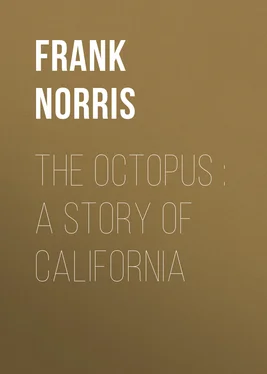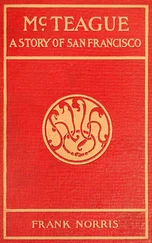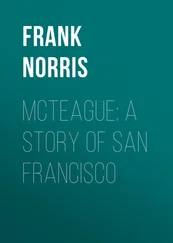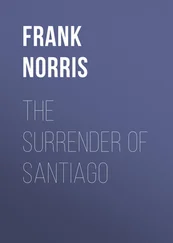Frank Norris - The Octopus - A Story of California
Здесь есть возможность читать онлайн «Frank Norris - The Octopus - A Story of California» — ознакомительный отрывок электронной книги совершенно бесплатно, а после прочтения отрывка купить полную версию. В некоторых случаях можно слушать аудио, скачать через торрент в формате fb2 и присутствует краткое содержание. Жанр: foreign_prose, literature_19, foreign_antique, на английском языке. Описание произведения, (предисловие) а так же отзывы посетителей доступны на портале библиотеки ЛибКат.
- Название:The Octopus : A Story of California
- Автор:
- Жанр:
- Год:неизвестен
- ISBN:нет данных
- Рейтинг книги:5 / 5. Голосов: 1
-
Избранное:Добавить в избранное
- Отзывы:
-
Ваша оценка:
- 100
- 1
- 2
- 3
- 4
- 5
The Octopus : A Story of California: краткое содержание, описание и аннотация
Предлагаем к чтению аннотацию, описание, краткое содержание или предисловие (зависит от того, что написал сам автор книги «The Octopus : A Story of California»). Если вы не нашли необходимую информацию о книге — напишите в комментариях, мы постараемся отыскать её.
The Octopus : A Story of California — читать онлайн ознакомительный отрывок
Ниже представлен текст книги, разбитый по страницам. Система сохранения места последней прочитанной страницы, позволяет с удобством читать онлайн бесплатно книгу «The Octopus : A Story of California», без необходимости каждый раз заново искать на чём Вы остановились. Поставьте закладку, и сможете в любой момент перейти на страницу, на которой закончили чтение.
Интервал:
Закладка:
Vanamee was silent for a moment, looking off with unseeing eyes between the trunks of the pear trees, over the little valley.
“That may all be as you say,” he answered after a while. “I have not learned it yet, in any case. Now, I only know that I love her—oh, as if it all were yesterday—and that I am suffering, suffering, always.”
He leaned forward, his head supported on his clenched fists, the infinite sadness of his face deepening like a shadow, the tears brimming in his deep-set eyes. A question that he must ask, which involved the thing that was scarcely to be thought of, occurred to him at this moment. After hesitating for a long moment, he said:
“I have been away a long time, and I have had no news of this place since I left. Is there anything to tell, Father? Has any discovery been made, any suspicion developed, as to—the Other?”
The priest shook his head.
“Not a word, not a whisper. It is a mystery. It always will be.”
Vanamee clasped his head between his clenched fists, rocking himself to and fro.
“Oh, the terror of it,” he murmured. “The horror of it. And she—think of it, Sarria, only sixteen, a little girl; so innocent, that she never knew what wrong meant, pure as a little child is pure, who believed that all things were good; mature only in her love. And to be struck down like that, while your God looked down from Heaven and would not take her part.” All at once he seemed to lose control of himself. One of those furies of impotent grief and wrath that assailed him from time to time, blind, insensate, incoherent, suddenly took possession of him. A torrent of words issued from his lips, and he flung out an arm, the fist clenched, in a fierce, quick gesture, partly of despair, partly of defiance, partly of supplication. “No, your God would not take her part. Where was God’s mercy in that? Where was Heaven’s protection in that? Where was the loving kindness you preach about? Why did God give her life if it was to be stamped out? Why did God give her the power of love if it was to come to nothing? Sarria, listen to me. Why did God make her so divinely pure if He permitted that abomination? Ha!” he exclaimed bitterly, “your God! Why, an Apache buck would have been more merciful. Your God! There is no God. There is only the Devil. The Heaven you pray to is only a joke, a wretched trick, a delusion. It is only Hell that is real.”
Sarria caught him by the arm.
“You are a fool and a child,” he exclaimed, “and it is blasphemy that you are saying. I forbid it. You understand? I forbid it.”
Vanamee turned on him with a sudden cry. “Then, tell your God to give her back to me!”
Sarria started away from him, his eyes widening in astonishment, surprised out of all composure by the other’s outburst. Vanamee’s swarthy face was pale, the sunken cheeks and deep-set eyes were marked with great black shadows. The priest no longer recognised him. The face, that face of the ascetic, lean, framed in its long black hair and pointed beard, was quivering with the excitement of hallucination. It was the face of the inspired shepherds of the Hebraic legends, living close to nature, the younger prophets of Israel, dwellers in the wilderness, solitary, imaginative, believing in the Vision, having strange delusions, gifted with strange powers. In a brief second of thought, Sarria understood. Out into the wilderness, the vast arid desert of the Southwest, Vanamee had carried his grief. For days, for weeks, months even, he had been alone, a solitary speck lost in the immensity of the horizons; continually he was brooding, haunted with his sorrow, thinking, thinking, often hard put to it for food. The body was ill-nourished, and the mind, concentrated forever upon one subject, had recoiled upon itself, had preyed upon the naturally nervous temperament, till the imagination had become exalted, morbidly active, diseased, beset with hallucinations, forever in search of the manifestation, of the miracle. It was small wonder that, bringing a fancy so distorted back to the scene of a vanished happiness, Vanamee should be racked with the most violent illusions, beset in the throes of a veritable hysteria.
“Tell your God to give her back to me,” he repeated with fierce insistence.
It was the pitch of mysticism, the imagination harassed and goaded beyond the normal round, suddenly flipping from the circumference, spinning off at a tangent, out into the void, where all things seemed possible, hurtling through the dark there, groping for the supernatural, clamouring for the miracle. And it was also the human, natural protest against the inevitable, the irrevocable; the spasm of revolt under the sting of death, the rebellion of the soul at the victory of the grave.
“He can give her back to me if He only will,” Vanamee cried. “Sarria, you must help me. I tell you—I warn you, sir, I can’t last much longer under it. My head is all wrong with it—I’ve no more hold on my mind. Something must happen or I shall lose my senses. I am breaking down under it all, my body and my mind alike. Bring her to me; make God show her to me. If all tales are true, it would not be the first time. If I cannot have her, at least let me see her as she was, real, earthly, not her spirit, her ghost. I want her real self, undefiled again. If this is dementia, then let me be demented. But help me, you and your God; create the delusion, do the miracle.”
“Stop!” cried the priest again, shaking him roughly by the shoulder. “Stop. Be yourself. This is dementia; but I shall NOT let you be demented. Think of what you are saying. Bring her back to you! Is that the way of God? I thought you were a man; this is the talk of a weak-minded girl.”
Vanamee stirred abruptly in his place, drawing a long breath and looking about him vaguely, as if he came to himself.
“You are right,” he muttered. “I hardly know what I am saying at times. But there are moments when my whole mind and soul seem to rise up in rebellion against what has happened; when it seems to me that I am stronger than death, and that if I only knew how to use the strength of my will, concentrate my power of thought—volition—that I could—I don’t know—not call her back—but—something–”
“A diseased and distorted mind is capable of hallucinations, if that is what you mean,” observed Sarria.
“Perhaps that is what I mean. Perhaps I want only the delusion, after all.”
Sarria did not reply, and there was a long silence. In the damp south corners of the walls a frog began to croak at exact intervals. The little fountain rippled monotonously, and a magnolia flower dropped from one of the trees, falling straight as a plummet through the motionless air, and settling upon the gravelled walk with a faint rustling sound. Otherwise the stillness was profound.
A little later, the priest’s cigar, long since out, slipped from his fingers to the ground. He began to nod gently. Vanamee touched his arm.
“Asleep, sir?”
The other started, rubbing his eyes.
“Upon my word, I believe I was.”
“Better go to bed, sir. I am not tired. I think I shall sit out here a little longer.”
“Well, perhaps I would be better off in bed. YOUR bed is always ready for you here whenever you want to use it.”
“No—I shall go back to Quien Sabe—later. Good-night, sir.”
“Good-night, my boy.”
Vanamee was left alone. For a long time he sat motionless in his place, his elbows on his knees, his chin propped in his hands. The minutes passed—then the hours. The moon climbed steadily higher among the stars. Vanamee rolled and smoked cigarette after cigarette, the blue haze of smoke hanging motionless above his head, or drifting in slowly weaving filaments across the open spaces of the garden.
But the influence of the old enclosure, this corner of romance and mystery, this isolated garden of dreams, savouring of the past, with its legends, its graves, its crumbling sun dial, its fountain with its rime of moss, was not to be resisted. Now that the priest had left him, the same exaltation of spirit that had seized upon Vanamee earlier in the evening, by degrees grew big again in his mind and imagination. His sorrow assaulted him like the flagellations of a fine whiplash, and his love for Angele rose again in his heart, it seemed to him never so deep, so tender, so infinitely strong. No doubt, it was his familiarity with the Mission garden, his clear-cut remembrance of it, as it was in the days when he had met Angele there, tallying now so exactly with the reality there under his eyes, that brought her to his imagination so vividly. As yet he dared not trust himself near her grave, but, for the moment, he rose and, his hands clasped behind him, walked slowly from point to point amid the tiny gravelled walks, recalling the incidents of eighteen years ago. On the bench he had quitted he and Angele had often sat. Here by the crumbling sun dial, he recalled the night when he had kissed her for the first time. Here, again, by the rim of the fountain, with its fringe of green, she once had paused, and, baring her arm to the shoulder, had thrust it deep into the water, and then withdrawing it, had given it to him to kiss, all wet and cool; and here, at last, under the shadow of the pear trees they had sat, evening after evening, looking off over the little valley below them, watching the night build itself, dome-like, from horizon to zenith.
Читать дальшеИнтервал:
Закладка:
Похожие книги на «The Octopus : A Story of California»
Представляем Вашему вниманию похожие книги на «The Octopus : A Story of California» списком для выбора. Мы отобрали схожую по названию и смыслу литературу в надежде предоставить читателям больше вариантов отыскать новые, интересные, ещё непрочитанные произведения.
Обсуждение, отзывы о книге «The Octopus : A Story of California» и просто собственные мнения читателей. Оставьте ваши комментарии, напишите, что Вы думаете о произведении, его смысле или главных героях. Укажите что конкретно понравилось, а что нет, и почему Вы так считаете.












